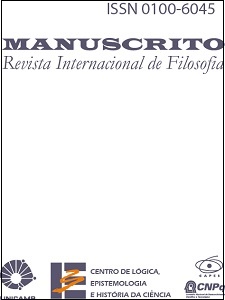Resumo
This article aims to vindicate the commonsensical view that what we think affects what we do. In order to show that mental properties like believing, desiring and intending are causally explanatory, I propose a nonreductive, materialistic account that identifies beliefs and desires by their content, and that shows how differences in the contents of beliefs and desires can make causal differences in what we do.
Referências
Anscombe, G.E.M. (1981). Causality and Determination. In: Metaphyscis and the Philosophy of Mind: Collected Philosophical Papers, Volume II (Minneapolis, University of Minnesota Press), pp. 133- 147.
Baker, L.R. (1993). Metaphysics and Mental Causation. In: John Heil and Alfred Mele (eds.), Mental Causation (Oxford, Clarendon Press), pp. 75-96.
Baker, L.R. (2000). Persons and Bodies: A Constitution View (Cambridge, Cambridge University Press).
Gulick, R. van (2001). Reduction, Emergence and Other Recent Options on the Mind/Body Problem: A Philosophical Overview, Journal of Consciousness Studies, 8, pp. 1-34.
Kim, J. (1988). Explanatory Realism, Causal Realism, and Explanatory Exclusion. In: Peter A. French, Theodore E. Uehling, Jr., Howard K. Wettstein (eds.), Midwest Studies in Philosophy XII: Realism and Antirealism (Minneapolis, University of Minnesota).
Kim, J. (1993). Causes and Counterfactuals. In: Ernest Sosa and Michael Tooley (eds.), Causation (Oxford, Oxford University Press).
Kim, J. (1993a). Multiple Realization and the Metaphysics of Reduction. In: Supervenience and Mind (Cambridge, Cambridge University Press).
Pereboom, D. and Kornblith, H. (1991). The Metaphysics of Irreducibility, Philosophical Studies, 63, pp. 125-145.
Schaffer, J. (s.d). Evidence for Fundamentality?.

Este trabalho está licenciado sob uma licença Creative Commons Attribution 4.0 International License.
Copyright (c) 2002 Manuscrito: Revista Internacional de Filosofia

